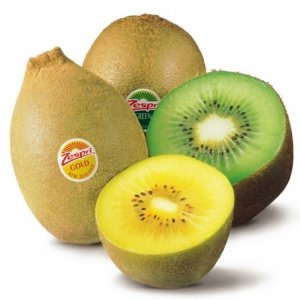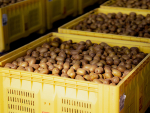Zespri this week released the start of a recovery pathway from the devastating vine-killing disease Psa involving the wide-scale release of a newly commercialised gold kiwifruit variety, known as Gold3.
Zespri chairman John Loughlin says it is a major milestone for the industry.
Since Psa was confirmed in New Zealand in November 2010, it has infected over 40% of the country's kiwifruit hectares. The level of infection in orchards ranges from low-level leaf-spotting symptoms to entire orchards having to be cut out.
Psa has been particularly devastating on the original Zespri Gold kiwifruit variety, known as Hort16A, with around a third of the country's Hort16A orchards predicted to be cut out by the end of the 2012 harvest due to infection.
Loughlin says because of the extreme vulnerability of Hort16A to Psa, the recovery pathway was focused on moving current Hort16A growers across to growing Gold3, which is showing good Psa tolerance combined with proven characteristics to make it a commercial success. Those key commercial qualities include taste, quality and consistency, storage and market performance.
Gold3 has naturally high orchard yields, appears easier to manage through the supply chain than Hort16A, stores well late in the season and delivers a good eating experience to consumers, with positive responses received through in-market consumer sensory work over consecutive seasons.
While no variety is fully resistant to Psa, Gold3 appears to be showing a good level of tolerance, compared to Hort16A and 45 other varieties from the same kiwifruit species. This is supported by an extensive laboratory research programme, and also more importantly by observations and experience on orchard in both New Zealand and offshore.
Under the recovery pathway all current Hort16A growers will be able to access Gold3 licences if they choose to graft across. Once a grower has grafted across it will take up to three years for them to return to full production.
A further 400ha of Gold3 are being released to allow other growers the opportunity to diversify their orchards into different varieties of kiwifruit and in doing so diversify their income streams.
"Zespri is being very clear to growers that this pathway is not without risk. We do not have all the knowledge on either the Psa or the commercial performance of Gold3. However, based on what is known to date we are confident this pathway is realistic and gives the industry its best chance of coming out of Psa," Loughlin says
New Zealand Kiwifruit Growers president Neil Trebilco says while the release of the pathway signalled fresh hope for growers, there was still some distance to go before the industry recovered from Psa.
"There will be more orchardists who will need to cut their orchards out, which means they will be without income for at least a further year until their Gold3 vines begin to produce a crop.
"While it is great to be talking about a starting point, we have to remember that many growers will be hurting for some time yet.
"That we have got to this point is because of our unified industry structure, which has ensured that the response to Psa has been as focused and coordinated as possible. Once again our industry structure has overwhelmingly proven its benefit to all growers," Trebilco says.
Kiwifruit Vine Health (KVH), the pan-industry body established to manage the industry response to Psa, says the wide release of Gold3 is a major step in the recovery pathway.
KVH spokesman Terry Richards says this is a significant step but that the hard work continues for the industry as the disease remains a long-term risk for all kiwifruit growers.
"Our focus going forward is to continue to get best available scientific knowledge and practical information to growers about minimising the impact of Psa on orchards."



















